

No matter how often or rarely you use your gas stove, proper maintenance is essential to avoid hazardous incidents down the line.
Or else, you’ll find yourself scrubbing away the mess from a leaking stove, frantically calling a gas leak detection service for help.
As a home buddy, we have all the gas stove maintenance tips to help your kitchen stay spotless and shiny.
Let’s get into it!
Here are some proven tips gathered from our know-how, expert plumbers, and homemaking manuals.
Most people know how to use a gas stove. People use it to boil their favorite coffee, tea, or a pack of ramyeon, and home chefs have a regular cooking showdown at their home.
But not a lot of people pay attention to gas burners, and this is a rookie mistake that’ll incur higher gas burner service fees in the long run.
Gas burners are the components on the stovetop where the flames come out when you turn the knob on.
On a manual stovetop, a gas burner forms the shape of an oval or a round cylinder. Otherwise, it usually lies flat on an electric stovetop.
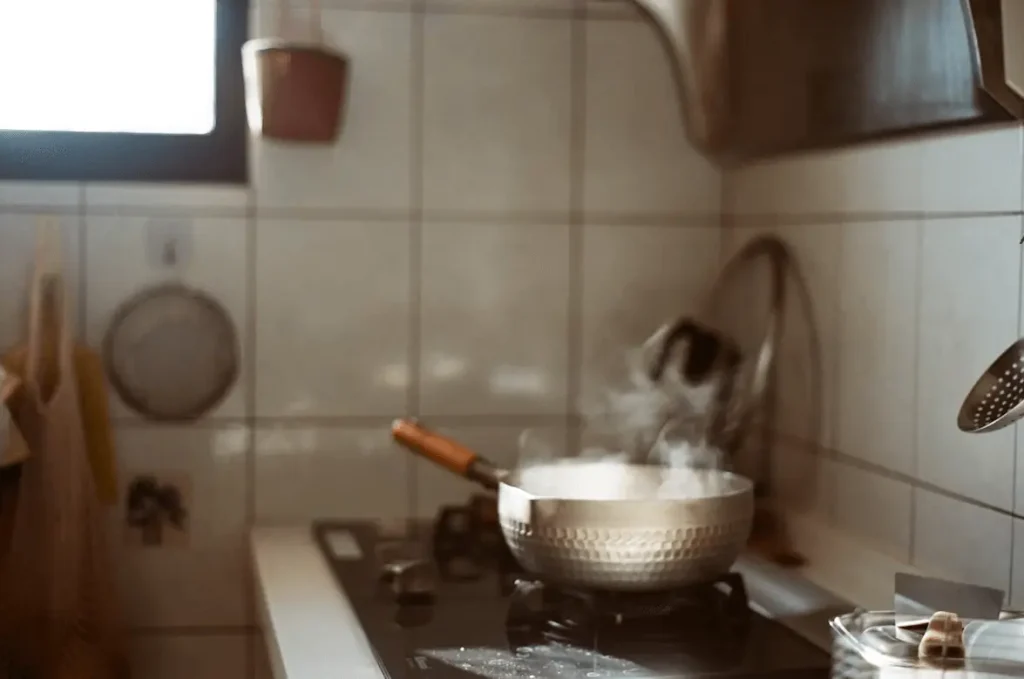
The ordeal of cleaning a gas stove is remarkably simple if you have an electric stovetop, as you’ll only have to wipe the surface with a dishwashing detergent and warm water on a clean cloth.
But manual gas burners can get clogged with grease or food debris. If you don’t clean them at all, it’ll produce an uneven flame, create soot buildup, or potentially lead to gas leaks or incomplete combustion (dangerous carbon monoxide).
To clean your gas burner, ensure that your stove is turned off. If you’ve just finished cooking, wait for it to completely cool.
Then, remove the burner grates and caps. Simply clean them with dish soap and vinegar or a tanis brush. Wait for the chemicals to react for a while before scrubbing and rinsing them off.
Most importantly, never pour water on your stove. Sooner or later, water will seep into your gas lines, resulting in electrical problems.
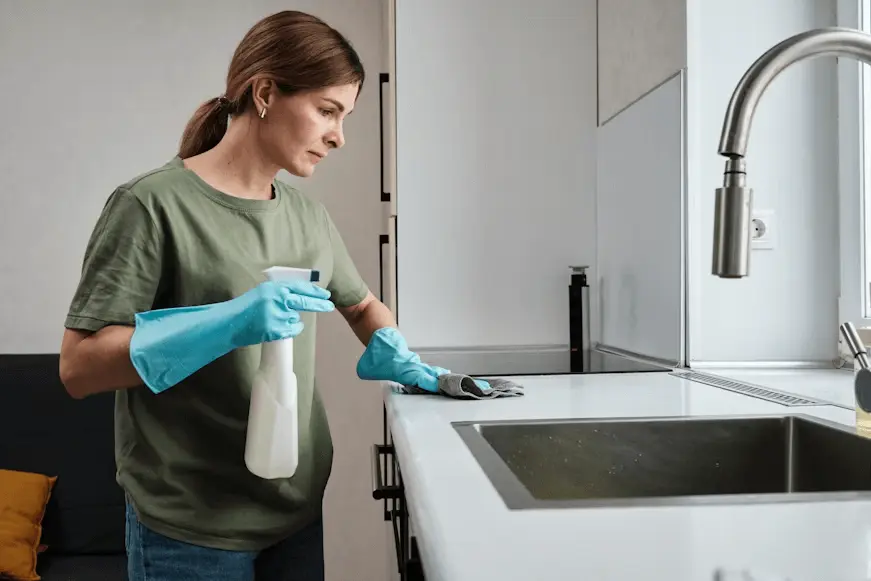
So now you know how to clean gas burners, but how often should you do it?
Truthfully, gas burners shouldn’t add more maintenance to your busy life, so it depends on your schedule. At the very least, wipe your burners after each cooking session with:
Here is also a little cheat sheet on how often you should clean your gas burners, so you don’t have to create your own schedule.
Starting from steel burners:
As for electric burners:
By following this schedule, not only will your kitchen stay squeaky clean, but you’ll also get rid of the gas smell.
Calling a licensed professional will bring greater benefits – not only for your initial gas cooktop installation but also for quarterly inspections.
It’s easy to ignore tiny leaks, but once the size of the leaks scales, it can get dangerous fast.
For a DIY approach, you can use a gas leak detector substance. Spread the thin goo carefully over a gas line connector. If you see any bubbles, then your gas is leaking, and it’s time for a repair.
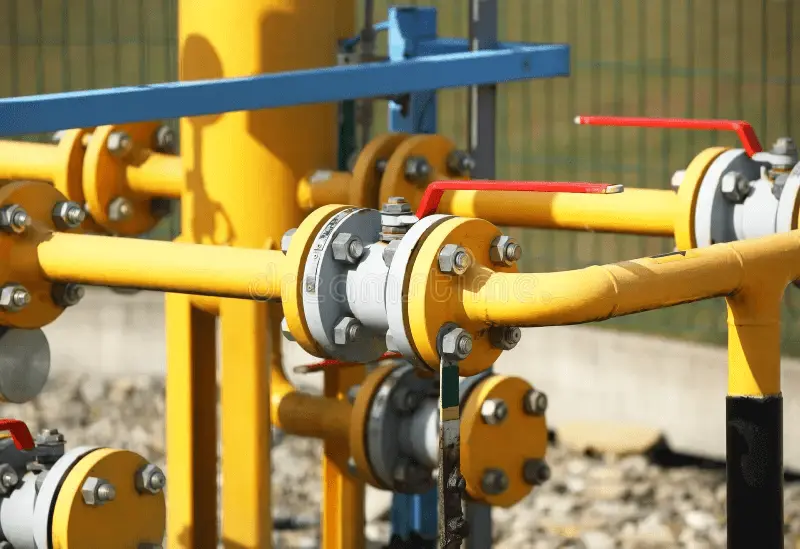
Gently check your gas line again. Minor stove movements or accidental bumps shouldn’t contribute to bigger leaks.
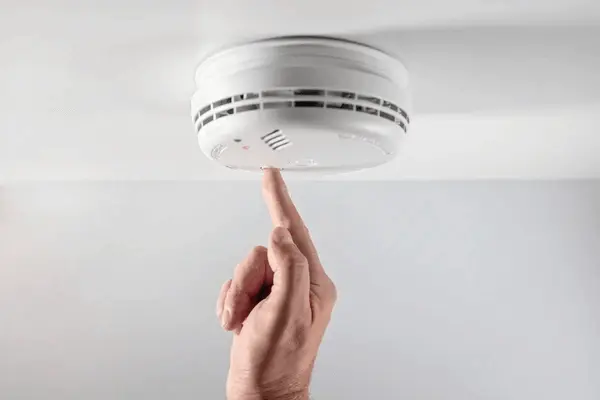
Preventing a gas leak starts with installing carbon monoxide detectors. Unlike smoke, natural gas tends to settle at floor level before rising, so you need to place these devices low on the ground.
Most people think that the kitchen will be the most suitable space, but you’ll end up getting irritated with frequent false alarms.
Position the detectors near the kitchen, but not inside it, so that the devices can still detect CO when harmful gas escapes and spreads.
If you hear four loud beeps per cycle, that’s an emergency. Open all the windows and doors to ventilate your home. Move everyone, including your beloved pets, outside for fresh air as you wait for the emergency service to arrive.
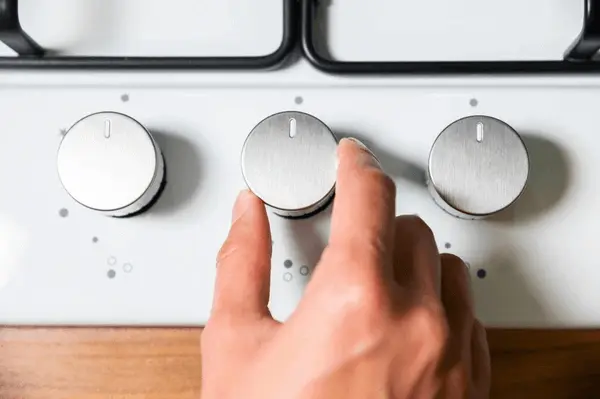
This sounds deceptively easy, but be careful around knobs. If you hang around the kitchen a lot, you might rest your hip or hand on the stove knobs without realizing it.
This will open the gas valve without lighting the burner, allowing gas to leak into the kitchen. If you ignite your stove, it’s a recipe for poisoning or even explosion.
You might think that this is over-the-top, but knobs on a gas stove don’t actually just control flame size. It also controls gas flow and ignition, and these are, unfortunately, things that we cannot see.
So, if you have kids around, tell them to never play around with knobs. Make it a house rule to never rest, push, or lean on knobs when the stove is inactive.
Also Read: What to Do If You Accidentally Leave Your Gas Stove On
Have some questions unanswered about how to clean the gas stove and more? We got you covered.
Each time after usage, a gas stove needs mild wiping.
Every month, deep cleaning is imperative, but some households do this once a week. When you do a deep clean, focus on removable parts like grates and caps to prevent clogs.
A gas stove should be checked by a professional every quarter or year. They’ll do a thorough inspection that not only involves your gas stove but also other appliances in your kitchen.
They’ll check for leaks, proper flame color and combustion, test the ignition system, and assess the overall condition of the stove and components like a gas bayonet.
You should check your gas stove annually. However, as soon as you spot red flags, such as rotten smell, yellow or orange flame, or continuous clicking sounds, you’ll need to immediately call a professional like Melbourne Gas Plumber.
Never pour water directly into your stove. It will seep into the gas lines, damage electrical components, and create short circuits or corrosion, leading to a costly repair bill.
For cleaning your gas burner, a DIY approach is recommended with vinegar, a tanis brush, or a baking soda and water mix.
Some people also use kitchen-grade cleaning solutions. For more stubborn grime, you might want to wear your gloves and soak the burner in an ammoniac solution overnight.
For more advanced servicing, such as adjusting your gas regulator, replacing igniters, or fixing internal components, it’s best to seek professional help.
Clean kitchen, clean mind. A well-maintained stove works more efficiently, uses less energy, and reduces the risk of unexpected breakdowns or dangerous gas leaks.
Think of these maintenance habits as part of your home’s long-term care plan. Follow these simple gas stove maintenance tips and stay on top of your inspection schedule.
Melbourne Gas Plumber will help you spot issues before they become serious and ensure your gas appliances run safely and efficiently for years to come.


Fill the form below and we’ll get back ASAP!

MGP! Thank you for help, honest pricing and high quality work. Thank you to Joe for pricing and the boys involved for replacing my hot water tank and fixing my gas leak for a reasonable price. 5 star response, 5 star service and 5 star price.
Joe was great. Very professional and quick. Gas hot water heater needed replacing, he was honest and upfront about what our options were. System was sourced and replaced within a couple of hours.
Fantastic service very responsive Joe is highly recommended and works very clean and neat..... good job well done....very happy... will use again and again

At Melbourne Gas Plumber, we're here to handle all your gas plumbing needs throughout Melbourne. With over 40 years of experience, we bring extensive local knowledge and expertise to every job.
QUICK LINKS
OPENING HOURS
Open 24/7
